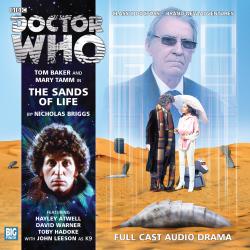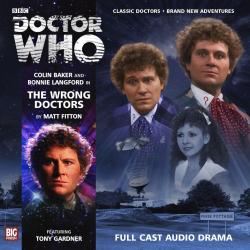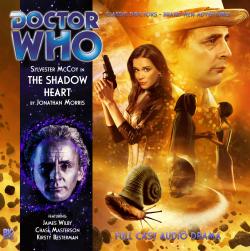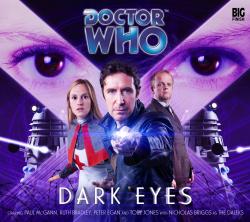The Sands of Life (Big Finish)
Tuesday, 26 February 2013 - Reviewed by Matt Hills

The Sands of Life
Big Finish Productions
Written by Nicholas Briggs
Directed by: Nicholas Briggs
Released February 2013
This three-part story features David Warner as Cuthbert, celebrity businessman and head of the Conglomerate. Aiming for total brand domination, Cuthbert seems to have Earth’s government pretty much in his pocket. And the character has his roots in Big Finish’s forerunner, the fan-produced Audio Visuals series, first appearing in The Destructor Contract. I have to say that despite Warner’s star turn, Cuthbert strikes me as a rather generic, unremarkable villain here. In fact, several elements of this story feel slightly predictable: it lacks the sharp structure and playful vitality of last month’s The Auntie Matter. At times, Cuthbert comes across as a cipher representing evil enterprise and General Vincent is likewise a rather standard version of the trigger-happy military figure. Hayley Atwell plays newly elected President Sheridan Moorkurk, but doesn’t have much to do in this story, while Cuthbert’s assistant Mr. Dorrick is well performed by Toby Hadoke. Like President Moorkurk, I assume this character will have a larger part to play in future.
There are some lovely dialogue and performance moments from both Tom Baker and Mary Tamm. The Doctor’s observation that “a telepathic sea-cow travelling in the time vortex, that’s unusual” is worth the cost of admission all on its own. And Romana’s acerbic aside, whilst being dragged to her doom, that she’s thinking about how to escape “among other things” is another witty little detail. Does she really need the Doctor to explain how to avoid this sandy fate, though? Her character, very much an independent force in last month’s adventure, occasionally regresses to companion-in-peril this time around.
The fourth Doctor and Romana are reunited with K9, yet the poor robot mutt is promptly left behind in the TARDIS because sand and heat will mess with his “bits”. It’s a gesture perhaps aimed at giving this audio production an authentic TV feel: after all, if they’d been filming in sandy terrain then obviously K9 would have been written out. But there’s no reason for it here, other than perhaps to raise the level of jeopardy that the Doctor and Romana face, and to sideline K9's Wikipedia-style info-dumping for a while.
‘The Sands of Life’ is self-consciously epic. Romana receives a mysterious telepathic message (you know it has to be significant, because it’s also the story title) and billions of alien Laan rapidly loom on the horizon. Threatening the Earth with such huge numbers plays to the strengths of an audio adventure, for sure, but it also raises the spectre of a Great Big Reset Button – perhaps this’ll be something to do with Cuthbert’s vague time-space experiments, or it’ll involve some capacity or other belonging to the TARDIS.
By far the most compelling thing about Nick Briggs’ script is that he ultimately avoids a standard Earth invasion story, despite so many of its trappings being present and correct. As we eventually learn, there’s something far more interesting going on, with the Doctor and Romana facing a genuinely difficult moral dilemma. Mind you, the Laan’s reason for arriving in the Sahara isn’t that difficult to guess after all the Doctor’s musings, and I think this might have worked better as a shock twist or ‘reveal’ rather than as something fairly clearly signposted.
Another incidental, fanboy pleasure is that The Sands of Life has some fun with continuity and audio clips as “time phasing” messes with the Doctor’s timeline. Some famous Genesis of the Daleks dialogue gets an outing, again implying that this may well be building to a devastating moral conundrum. Does the Doctor have the right? We’ll presumably find out across this “mini” arc of linked Nick Briggs’ stories. Continuity also gets in the way sometimes, though – a line about the randomiser being disrupted so that the TARDIS can be accurately piloted is clunky in the extreme. Yes, I know it solves a fan nitpick and allows the story to proceed, but it sticks out for precisely those reasons. “Ah”, the listener ends up thinking, “you’ve dodged a fan grumble there, well done.” Had Briggs again wanted to aim for TV-style authenticity he probably could’ve just ignored the randomiser and been done with it, but either his ‘inner fan’ couldn’t bear to knowingly introduce a continuity error, or the Big Finish Script Editor hates getting complaints.
It’s intriguing to have a major element from the Audio Visuals brought into the Big Finish universe, and although David Warner is always a pleasure to listen to, Cuthbert doesn’t yet seem an especially interesting character. Corporations are bad and powerful and corrupt… OK, but aren’t there less well-trodden paths for this sort of material? I hope that alongside its epic feel, later installments in the story arc will allow for greater characterization and greater divergence from default Who. The Sands of Life sometimes feels too smoothly engineered: a little more grit in the story-telling machinery wouldn’t have gone amiss.












